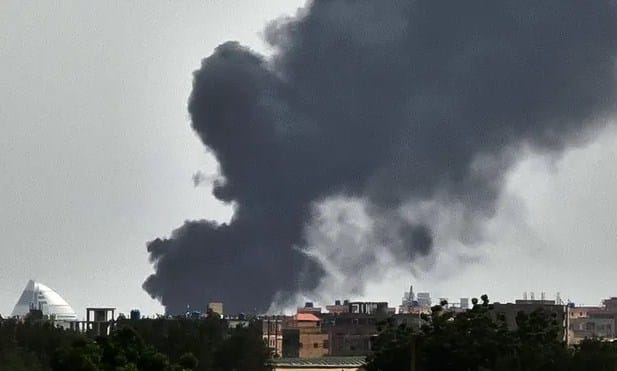Warring factions urged to preserve heritage after video clip appears to show fighters raiding Khartoum museum
Zeinab Mohammed Salih in Khartoum and Jason Burke
Heritage officials in Sudan have pleaded with warring factions to preserve tens of thousands of historical artefacts threatened by fighting in the capital, Khartoum, that is in its eighth week.
A video clip circulating on social media on Friday appeared to show fighters from the Rapid Support Forces entering the bioarchaeology lab of the National Museum in Khartoum and opening storage containers containing mummies and other remains.
The director of the National Museum, Dr Ghalia Gharelnabi, told the Guardian staff were “in a state of shock”.
“To start with, I did not believe what I was seeing. Now I am worried about where else they might have gone in the museum that no one filmed, and what else they are going to do,” said Gharelnabi, who fled to the Netherlands after an artillery shell hit her house in Khartoum on the first day of the war.
She said she was worried about the potential for clashes between RSF fighters and the army at the museum, which is regarded by experts as one of the most important such institutions in Africa.
The museum’s collection of more than 100,000 items includes embalmed mummies dating from 2,500BC, making them among the oldest and archaeologically most important in the world, as well as statues, pottery and ancient murals, with artefacts from the stone age through to the Christian and Islamic eras.
Staff were forced to abandon the National Museum, which is in central Khartoum and very close to frontlines between the warring factions, after fighting erupted on 15 April, forcing police guarding the facility to leave. One worker at the museum who lived nearby was checking the premises but was recently forced out of his home by the RSF.
The bioarchaeology lab was recently constructed with aid from the British Museum, and was Sudan’s first laboratory with the technology necessary to analyse bones found in excavations, Gharelnabi said.
On Saturday, the RSF issued a filmed statement denying its fighters had entered the museum and inviting any individuals or organisations to visit it to check.
Roxanne Trioux, part of a French archaeological team that was working in Sudan, said they had been monitoring satellite pictures of the museum and had already seen potential evidence of damage there before Friday, with signs of burning. “We don’t know the extent of damage inside,” she said.
Dr Rennan Lemos, an archaeologist at the University of Cambridge, said recent reports of damage to the Egyptian temple of Buhen, rebuilt in the museum’s courtyard, were very worrying.
“The Sudan National Museum houses collections attesting to human experience from the deep prehistorical past to the Kushite civilisations of Kerma, Napata and Meroe, and the ancient Egyptian presence in north Sudan,” said Lemos, who had been working at the museum when fighting broke out and was trapped for 10 days amid fierce clashes before escaping. “It is vital that the building, its research facilities and its collections are protected for the people of Sudan and for the whole world.”
There are also concerns for the tomb of the Muhammad Ahmad, better known as the Mahdi, who led a rebellion and established a state in Sudan in the 19th century, and a new museum that opened recently in Omdurman in the former home of Khalifa Abdullahi ibn Muhammad, who ruled Sudan before being defeated by the British in 1898.
Both have been occupied by the RSF and are being used as bases. This could attract devastating airstrikes or bombardment, it is feared.
Last week, a social science library at the University of Omdurman al-Ahlia was reportedly burned down, with the loss of thousands of books and some rare documents. There has also been fighting in and around Merowe, a well-known tourist attraction and historic site of enormous archaeological value about 270 miles north of Khartoum.
Gharelnabi said she was concerned Sudan’s rich archaeological heritage could share the same fate as that of Iraq and Syria after conflicts there. Both countries suffered widespread looting and loss.
“I call those who care about heritage and the organisations [to] come together and put pressure [on the warring sides],” she said.
Concerns have previously been raised about the collections at the Natural History Museum in Khartoum, which include live animals such as Nile crocodiles. Feeding of the animals stopped at the outbreak of the war and it is unclear if it has resumed. Many animals are thought to have died.
The conflict pits the paramilitary RSF, loyal to the warlord Mohamed Hamdan Dagalo, against the regular army commanded by Sudan’s de facto military ruler, Abdel Fattah al-Burhan.
Efforts to impose a durable ceasefire to allow humanitarian aid to reach millions of desperate civilians have failed and talks in Saudi Arabia have been suspended.
The end of the most recent truce on Saturday evening was preceded by reported clashes including air and artillery strikes in and around Khartoum.
On Friday, the UN security council called on the warring factions to cease hostilities to allow access to humanitarian organisations.
“The army is shelling us and the RSF are spread out in the streets, and the citizen is paying the price for war,” said Sami el-Tayeb, a 47-year-old resident of Omdurman.
The war has already displaced 1.2 million people inside the country and forced a further 400,000 to flee into neighbouring states, pushing Sudan to the brink of disaster and raising fears of a wider conflict.
